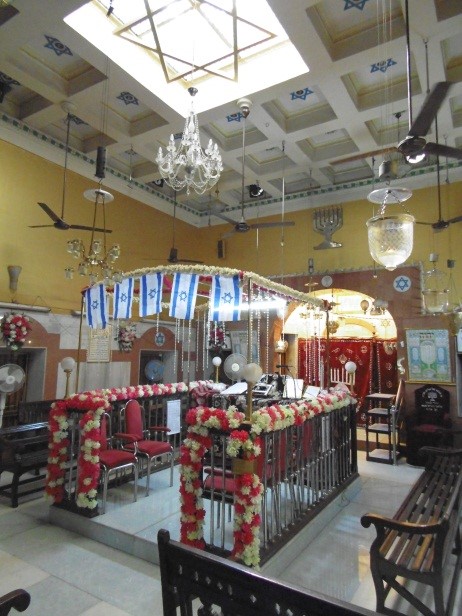SHAAR HASHAMAIM SYNAGOGUE (1879; enlarged and altered significantly over the years)
Located opposite Thana’s civil hospital
Tembi, Naka
Thana, Maharashtra, INDIA
This is India’s largest congregation and its most active synagogue. Guests should have no trouble visiting the synagogue, where regular Shabbat and holiday prayer services, event celebrations, educational programs, and many other religious and social activities are held here. The synagogue can be reached by taxi or the frequent yet crowded commuter train from Mumbai. The contact person for Shaar Hashamaim is the synagogue director Ezra Moses, and he can be reached via This email address is being protected from spambots. You need JavaScript enabled to view it. and "9322247231". A caretaker is regularly on duty during day-time hours, and he assist visitors.
Shaar Hashamaim (Hebrew for Gate of Heaven) congregation, located in suburban Thana to the northeast of Mumbai, was founded in the late nineteenth century to serve a Bene Israel community living well outside of the center of Mumbai. The foundation stone for their synagogue was laid on the "26th" of March "1878", and the building was completed on the "29th" of December "1879". This work was made possible by Samson David Mhedekar and many others among the community who had generously contributed to the project. On the "30th" of December "1879", under the direction of the trustee Samuel Moses Nagavker, Shaar Hashamaim was consecrated before the community and invited guests.
In more recent decades, with Mumbai’s considerable growth, Thana developed into a well-planned and desirable place to live away from the more congested and costly inner city. Commuter rail line service and good roads link Thana to Mumbai, allowing for an easy connection between the two places. As a result, Thana grew in size and popularity, and this included attracting more of the Bene Israel community. Shaar Hashamaim’s membership greatly expanded, and with this came the need for more synagogue space. Over the years the building, located opposite Thana’s civil hospital, has been added onto and expanded a number of times to accommodate the spiritual and communal needs of its congregation. An annex was added in "1970" to the north side of the original structure, and significant changes to the synagogue complex also occurred in "1994", "1998", and "2008".
Separated from the street by a high wall and gate, Shaar Hashamaim is made up of a compound of buildings, covered spaces, and outdoor areas. The two-story façade of the original synagogue building is finished in dressed stone that has been painted. The exterior features quoins at the corners, a band of trim dividing the ground and upper levels, and windows with paneled shutters. The result is a symmetrical, aesthetically-eclectic building typical of its period in this part of India. In front of this original building is a towering three-story addition dating to "2008". This addition contains a covered ground floor gathering area and a variety of social, support, and guest spaces above. A mikvah (ritual bath) and office spaces are also included. A recessed porch in the center of the original building with rounded arched openings contains not only many donation plaques but the doors opening into the sanctuary. The sanctuary is a rectangular double-height space with features typical to many Bene Israel and other Indian synagogues.
The sanctuary, modified over the years, includes a centrally-positioned raised tebah (bimah/reader’s platform where the Torah scrolls are read) contained by wood posts and metal balusters. The tebah, set on a marble base, features lights at the four corners and metal rods for a wedding chuppa (canopy). There is also the carved wood heckal (ark) set within a shallow niche positioned on the wall nearest to Jerusalem as per synagogue convention. The heckal is draped with a parochet, or fabric that separates the Torah scrolls from the sanctuary space, and it flanked by a pair of windows. To the sides of the heckal are two special chairs, one dedicated to the Prophet Elijah at the right, and left one used for the brit mila, or circumcision ceremony.
Completing the sanctuary are ceiling and wall fans, glass lanterns, metal hanging fixtures, wall sconces, Stars of David, a menorah (candelabra), and Hebrew prayer verse framings along the walls. The floor of the space is paved with blue and white marble, and the chunam (polished shell lime and sand) walls are painted. Covering the bottom section of the walls is red granite and white marble. Positioned along the walls of the sanctuary are large windows. Filing the space are wooden benches, never fixed to the floor as per Bene Israel and other Indian synagogue custom. On the ground floor are the benches for the men, and the stepped gallery level has chairs for the women. The ceiling of the sanctuary, altered in more recent years, is coffered with panels decorated with blue Stars of David or multi-colored rosettes. In the center of the coffered ceiling above the tebah in a skylight decorated with a large Star of David and blue tiles.
Today regular prayer services as well as community and social events are held at Shaar Hashamaim, and religious school is conducted on a weekly basis in the annex spaces that abuts the original building. Beginning in "1998", Rabbi Abraham Benjamin, who was born in Thana, began officiating over the congregation. The synagogue also includes a Jewish Men’s Club and Eve’s Association for the women. On a regular basis, life-cycle events are held here, including Bar and Bat Mitzvot, weddings, and other religious and social ceremonies. During major Jewish holidays, the building cannot accommodate the entire congregation, and some members spill out on to the synagogue’s porch and covered space underneath the addition.
Immediately behind Shaar Hashamaim is property owned and rented out by the synagogue, and nearby is a kosher butcher shop. The rental properties and entire synagogue have for years been managed by Ezra Moses.
For years, Shaar Hashamaim has been the largest congregation and the most active synagogue not only for India’s Bene Israel community but among all of India’s Jews. Some 40% of India’s estimated 4,500 Jews are affiliated with this synagogue. The very active Shaar Hashamaim, lovingly used by its membership, is a proud testament to Thane’s tradition of tolerance and of its religious and cultural diversity.

Exterior

Interior








